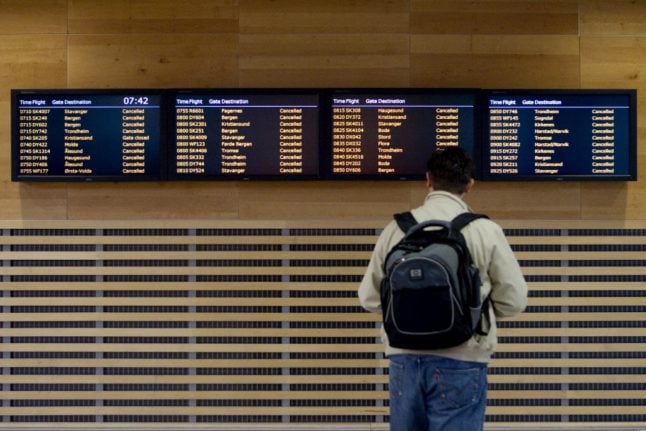The foreign minister was forced to travel back to Sweden unaccompanied in May 2007 after two of his bodyguards were held up in a security check at Heathrow Airport in London on the way home from a trip to Washington DC.
The Security Service (Säpo) officer at the centre of the case lost her temper when a female security guard began inspecting the bodyguards’ weapons parts, despite the fact that clearance had already been granted to transport the parts to Sweden.
Further enraged by a decision to confiscate a bag containing wine and chocolate, Bildt’s bodyguard began screaming at the guard.
In an internal memo composed on her return, the bodyguard admitted that tempers had flared.
“I got so angry that I snapped at her with the words ‘it’s fucking unbelievable’. She then snapped back, saying ‘this language is forbitten [sic] here’ or something like that, and I turned around and said ‘fuck you’ and she said something I don’t remember and I said ‘fuck you’ again.”
The bodyguard’s colleague then grabbed her by the arm and screamed at her to stop. But by then the damage was done and the security guard had left her post in tears.
“The woman became so upset that she ran away crying and I of course immediately regretted what had happened,” the woman wrote.
The incident led to the bodyguard and her colleague missing the flight, leaving Bildt to travel home unprotected.
Bildt arrived back on Swedish soil unharmed but the woman’s employer, Säpo, felt that her behaviour at Heathrow meant she was unsuitable to continue working as a bodyguard and instead assigned her to administrative duties.
Distressed by the reassignment, the woman went on sick leave three months after the swearing incident and did not return to work until November 30th last year.
On July 23rd 2007, the union writes in its submission to the Swedish Labour Court, the woman went on holidays for five weeks. On the last day of her vacation, she received a text message from her boss informing her that the matter was to be sent the prosecutor’s office in order to ascertain whether a crime had been committed.
Having already been removed from active bodyguard duty this was the final straw for the woman, according to the union, who went to her doctor and was put on full time sick leave.
The woman remains on half time sick leave since going back to work on November 30th, the date on which her contract to serve as a bodyguard officially expired.
The union characterizes as “trivial” the woman’s airport outburst and says her extended period of sick leave was “entirely caused by her treatment at the hands of her employer in connection with the incident on May 23rd 2007.”
The union has called on the state to pay the former bodyguard almost 800,000 kronor ($88,000) in damages for a combination of loss of income and alleged breaches of the terms of the relevant collective bargaining agreement.
The Swedish Police Union has also submitted its own 250,000 kronor damages claim for compensation arising from the state employer’s breach of contract with the union.
In negotiations held last year, the Public Employees’ Negotiation Council argued that the woman’s reassignment was tantamount to dismissal and could be viewed as “a form of harassment”.
But the Swedish Agency for Government Employers (SAGE), representing Säpo, said the woman had shown herself to be unsuitable to continue working as a bodyguard.
“A bodyguard has to be able to handle whatever situations arise in order to protect the person they are charged with protecting by making speedy and correct judgments in each individual situation before taking the appropriate action.”
SAGE said the woman must have been aware that she had “seriously neglected the duties assigned to her as a bodyguard and displayed a lack of judgment”.
The union’s summons was passed on to SAGE by the Swedish Labour Court on Wednesday and the case is likely to take nine to twelve months to process, a spokeswoman for the court told The Local.


 Please whitelist us to continue reading.
Please whitelist us to continue reading.